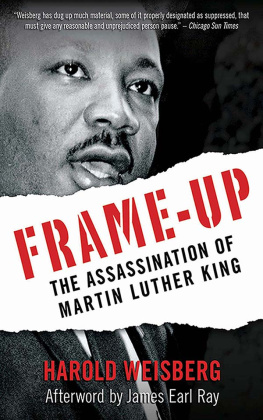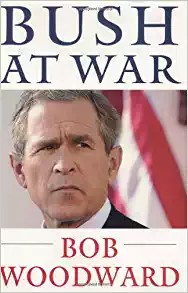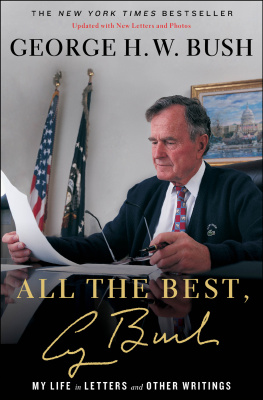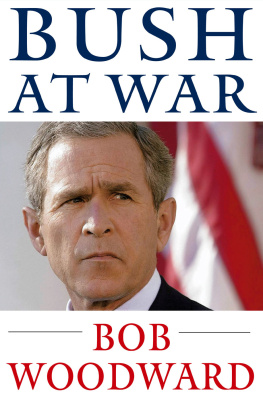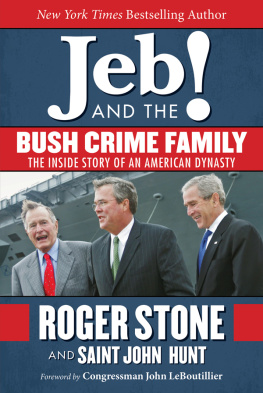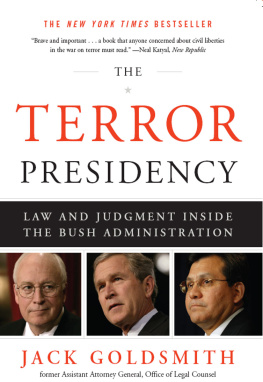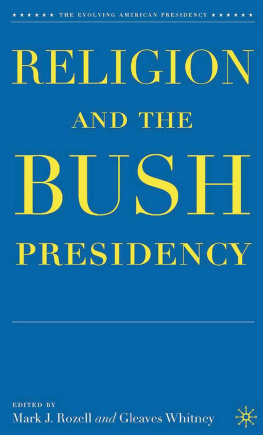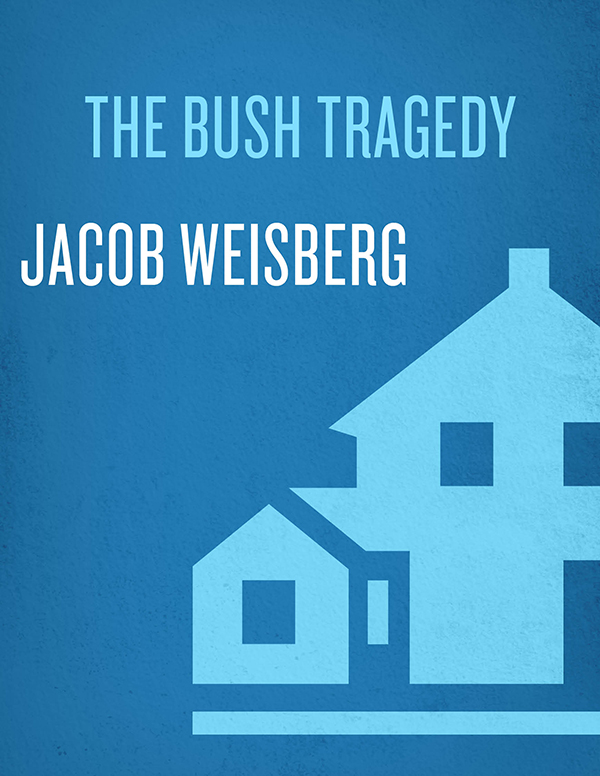
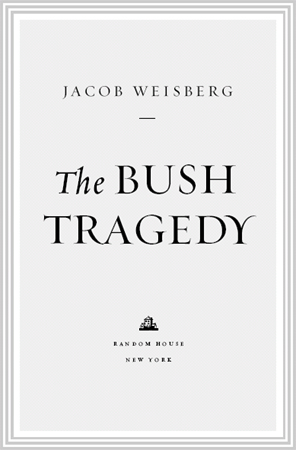
Contents
CHAPTER ONE
The Bushes and the Walkers
CHAPTER TWO
Father and Sons
CHAPTER THREE
The Gospel of George
CHAPTER FOUR
The Shadow
CHAPTER FIVE
The Foremost Hand
CHAPTER SIX
An Amiable Monster
CHAPTER SEVEN
Dead Precedents
To Deborah,
with love and gratitude
See, sons, what things you are!
How quickly nature falls into revolt
When gold becomes her object!
For this the foolish over-careful fathers
Have broke their sleep with thoughts, their brains with care, Their bones with industry;
For this they have engrossed and piled up
The cankerd heaps of strange-achieved gold;
For this they have been thoughtful to invest
Their sons with arts and martial exercises:
When, like the bee, culling from every flower
The virtuous sweets,
Our thighs packd with wax, our mouths with honey,
We bring it to the hive, and, like the bees,
Are murdered for our pains.
HENRY IV, PART 2
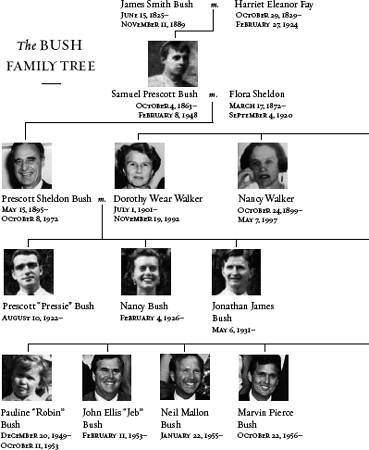
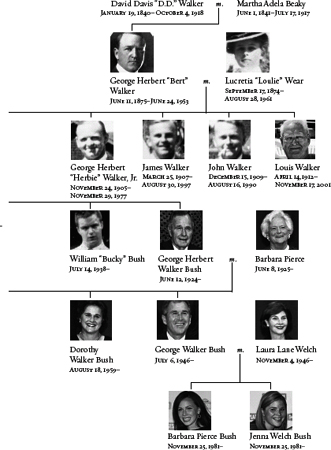
Introduction
PRINCE HAL IN HOUSTON

The commonwealth is sick of their own choice.
HENRY IV, PART 2
I F YOU HAD TO EXPLAIN THE SECOND BUSH PRESIDENCY THROUGH the lens of a single day, the day to choose would be May 1, 2003, when George W. arrived by fighter jet on the deck of the USS Abraham Lincoln. Pulling off his white aviators helmet and hopping down onto the deck of the aircraft carrier, he embraced cheering sailors just returned from Afghanistan and the Persian Gulf. Removing his parachute harness, Bush exchanged a few surly words with the pool reporters covering the event. Had the president taken the controls of the plane from the co-pilot seat? Yes, I flew it! Did he enjoy it? Of course I liked it!
Those who criticized Bush for playing soldier that day missed the way in which he was playing a specific soldier: his dad, circa 1944. After twice zipping past the aircraft carrier, the presidents Navy S-3B Viking executed a perfect tailhook landing. Hitting the deck at 150 mph, the fighter plane caught the steel wires stretched across the flight deck and screeched to a halt in less than four hundred feet. This was the dangerous maneuver his father executed more than a hundred times as the pilot of a Grumman TBM Avenger, over the same ocean, in World War II.
Back when he applied to the Texas Air National Guard in 1968, George W. had a simple explanation for an officer he hoped would help him get in. I want to be a fighter pilot because my father was, he said. Like most other members of his social class, Bush was of course eager to avoid Vietnam. He didnt volunteer for the air force or navy, where he could have flown real combat missions. But that doesnt mean his cover story wasnt also true. Nearly everything he did in his youth represented an attempt to emulate his beloved, successful fatherwith unimpressive and sometimes farcical results. Only following a midlife crisis at forty did he begin to succeed. The triumphant arrival was an apt metaphor for George W. Bushs life and career to that moment. After years of trying to be like his father and failing, as a student, athlete, businessman, and politician, George Junior had finally gotten it right. On the third pass, his plane safely executed the difficult landing.
Lest anyone miss it, the message of the day was spelled out on a giant banner stretched across the ships tower: MISSION ACCOMPLISHED. Bush patted backs, posed for pictures, and shook hands with the ships crew members, who surely would have borne him aloft if not for the presence of the Secret Service. As the sailors cheered from the observation deck, Bush looked up and raised both arms over his head, the body language of triumph. Every gesture of the presidents that day spoke to his feelings of personal as well as national vindication. The mission he thought he had accomplished was not just vanquishing Saddam Hussein, but overcoming his fathers shadow. For that brief, shining moment, righteous purpose and psychological need were fully joined.
That evening, the president appeared live from the deck of the ship to announce the end of major combat operations in Iraq. In the battle of Iraq, the United States and our allies have prevailed, he declared. The invasion had been carried out with a combination of precision, speed and boldness the enemy did not expectand the world had not seen before. Bush then spoke directly to the men and women on the ship: Your courageyour willingness to face danger for your country and for each othermade this day possible. His exultant declarations built to a stern warning to other dictators not to defy his will. Let tyrants fear, Bush proclaimed.
A little over a year later, this dramatization of the sons pride was followed by a vignette of his fathers pain. Bush Senior has always made a point of not taking criticism from his children personally. In 1998, he wrote an affecting letter to his two sons in politics, telling them to feel free to challenge his views, and not to worry about people drawing contrasts unflattering to their father. But by mid-2004, Bush Senior couldnt help feeling wounded by some of his oldest sons comments. During the 2004 Republican convention in New York City, the former president appeared on Don Imuss show, where the host asked about George W.s statement in an interview with The Washington Times that he didnt intend to send mixed signals to the Iraqi people or to cut and run early, like what happened in 91.
I didnt like that much, George H. W. Bush told Imus. Frankly, it hurt a little bit. The elder Bush usually kept such thoughts to himself. This was the first time he had publicly disagreed with his son, and he quickly backtracked. After saying that he was proud of what his own administration had done during the first Gulf War, the former president minimized what might have appeared as criticism by adding, in a classic bit of Bushese, that he didnt want to sound like the nutty father unleashed out there. We dont need that. I had my chance.
But Bush couldnt resist saying a few words more. The Bush presidents, father and son, are not introspective men and they fiercely resist any form of psychological explanation. I dont think he personally felt that I have to compete with my dad, the elder Bush went on. You read all this psychobabble stuff and I know that its not true. These damn issues now for me, they dont matter. What does matter to me, though, is if they have assigned things to him in some salon in the Upper East Side of New York that he is trying to get out from under some shadow to escape his father and to have his own legacy and not his dad [sic]. Maybe there were people around him four years ago who felt that way.
Read this answer closely, and you can track the fathers surrender to the reality of his sons challenge: Its not true. Its psychobabble. It bothers me that elitist snobs say it. My sons political advisers are responsible for it.
Next page

